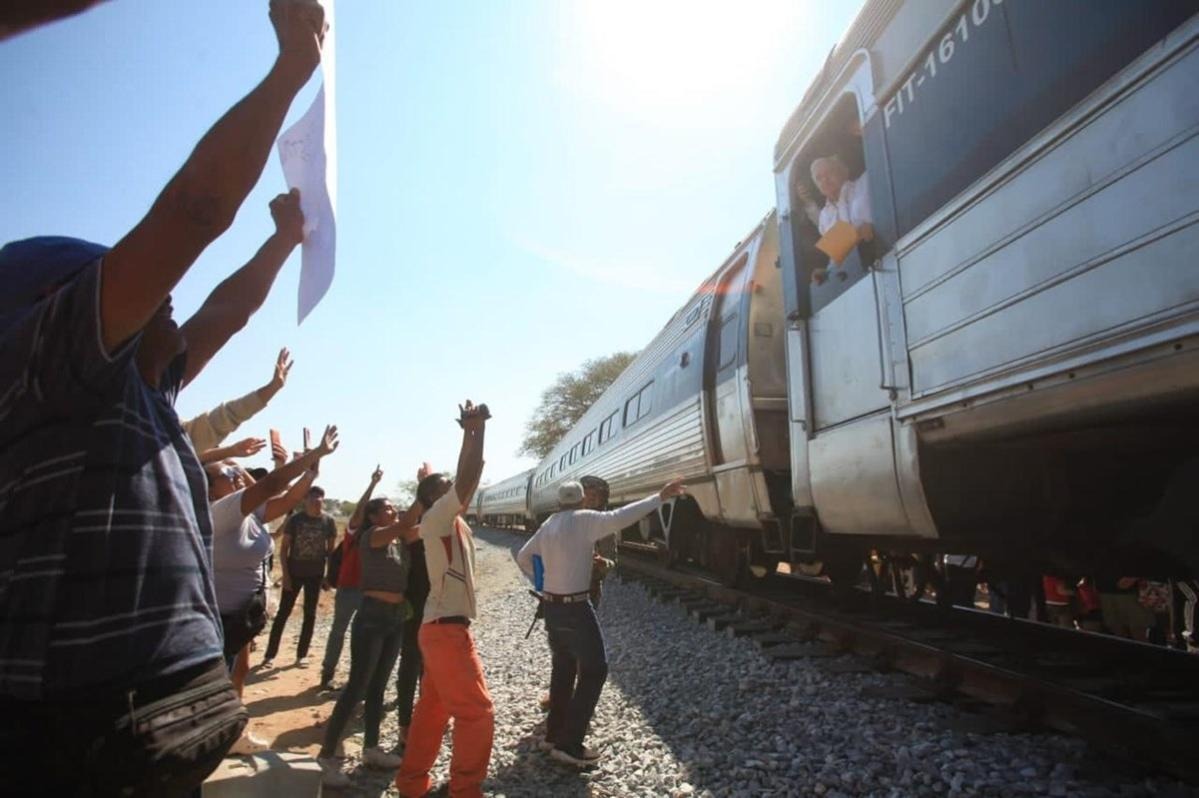The Istmo, a Territory in Dispute.
The region known as the Isthmus of Tehuantepec, located in the state of Oaxaca in southeastern Mexico, is a territory of indigenous peoples that has become a zone of environmental and social sacrifice, as it is a setting where, for more than a hundred years, attempts have been made to impose megaprojects that, in essence, seek to take advantage of its natural characteristics due to its narrow geography that separates the Atlantic Ocean from the Pacific Ocean by only 300 kilometres.
Historically, Western powers such as England, France and the United States have disputed the economic control of this region, mainly because it is a strategically important inter-oceanic corridor for the global circuit of goods. For more than 100 years, the Isthmus of Tehuantepec has been converted into an energy generating and transforming zone. The first refinery in Mexico was owned by English capital and opened in Minatitlán, Veracruz in 1907. Sixty years later, in Salina Cruz, Oaxaca, construction work began on the Antonio Dovalí Jaime refinery. Also in the 1970s, three large petrochemical complexes were established in the Veracruz portion of the Isthmus. All these projects had a strong impact on us, the indigenous communities, that inhabit the region. At the beginning of the new millennium, a Mexican president with an English surname launched the so-called Plan Puebla-Panama (PPP), a mega-project that sought to modernise the energy and communications infrastructure in the entire Mesoamerican area.
Since 2007, foreign direct investment has grown exponentially in our region with a goal of dominating territories and expanding their businesses where the local population does not benefit. Transnational corporations, mainly European, have turned the Isthmus of Tehuantepec into the main area for the generation of electricity from renewable sources in Mexico. Currently, for example, more than 2,000 wind turbines are in operation in 29 wind farms. The imposition of these mega-projects has meant a high social, environmental and cultural cost for the 12 indigenous peoples living in the region: dispossession, violence, acculturation and severe damage to Mother Earth, which has led to numerous resistance actions over the years, including rebellions, local protests and national mobilisations.
The impacts of globalisation
For many years, the defence of these territories was carried out in isolation, and this was undoubtedly a weakness, until, following the uprising of the Zapatista armed movement and the imposition of the PPP, we built a process of multi-sectoral articulation of the peoples of Mesoamerica, which allowed us to confront this plan for the expansion of global capital with greater strength. However, by 2013, this Mesoamerican articulation disappeared, as priority was given to national agendas.
In the analysis of global relations in order to understand what was happening to us, our main points of reference were authors such as Immanuel Wallerstein (world-systems theory) and the theorists of the so-called dependency theory (Fernando Cardozo and Theotonio do Santos). To these references, it was necessary to incorporate concepts such as globalisation and neoliberalism, to try to better understand the context in which we develop our struggles as defenders of the territory in Abya Yala. However, these references and concepts told us little, as they were elaborated from a Eurocentric, academic point of view and in a way ignored the current global dynamics. It was in recent years that we became aware of the analysis of the multiple global crisis, elaborated by authors from the Kurdistan Liberation Movement, especially in the writings of Abdullah Öcalan, which, we believe, contributes to the understanding of the current global context in which our struggles in defence of life are framed.
Previously, our understanding of capital’s expansion plans in our region was reduced to trying to understand the process, but from a local and isolated perspective, both nationally and globally; that is, we understood the mega-projects in our region as unconnected processes. This partial vision, as a political perspective, of course weakened us, wore us down and eventually led us to defeat. By failing to understand how the ‘powers of capitalist modernity’ want to reshape the world according to their interests, our blows have been weak and out of focus. Hence the importance of connecting the analyses in a global vision in order to understand the origin and functioning of state domination in today’s capitalist modernity.
At the end of 2018, President López Obrador announced in a letter to President Trump the implementation of several mega-projects whose impact area would be the Mexican south-east. Among them, the Interoceanic Corridor of the Isthmus of Tehuantepec, the poorly named Tren Maya and the construction of the Dos Bocas refinery was at the centre of the state’s agenda. In the first stage, the implementation of the three projects was carried out with fiscal resources and implied the militarisation and expansion of criminal groups throughout south-east Mexico.
In the last six years, the three projects have made significant progress despite the resistance of indigenous peoples and organisations. This resistance has been carried out in in separation from each other, despite the fact that mega-projects are closely related to each other. In recent times, the different struggles have once again been linked at the national level, and actions are being carried out to create and recreate relations of joint action with Latin American, European and North American social organisations.
A new view
For a few years now, we have had theoretical and personal contact with the struggles of the Kurdish people in the Middle East and their diaspora in Europe, in particular with the paradigms proposed to us by the autonomous experience of Rojava in the North and East of Syria. Despite the geographical and cultural distance, we identify with the principles of Democratic Confederalism, with the fundamental participation of women as the axis of liberation and the relationship of respect that must exist with Mother Earth, Nature and the ecological system. We even managed to identify some common ground between the struggle of the peoples of Kurdistan and the struggles of Zapatistas or the Mapuches in Chile, as a result of the dialogue we have had with the Kurdish activists who have visited our struggles. This undoubtedly brought us closer to the theoretical proposal of Abdullah Öcalan and other theorists of the Kurdish Liberation Movement.
Sometime later, reading the small but enriching text, Opportunities and Dangers of the Third World War, produced by the Academy of Democratic Modernity, allowed us to understand the character and scope of the existing conflict between the Mexican state and the global powers, and also allowed us to understand how in our territory and in Latin America, the accelerated dispute for investment spaces and control of ports between China and the United States was one more expression of what Öcalan calls the Third World War. This dispute is accelerating the construction of ports and gas pipelines in Mexico and, with it, the processes of dispossession and violence against the owners of the territory are intensifying. Life is at risk.
The points where we perceive this dispute to be most intense are undoubtedly the seaports and, particularly, those located in existing or planned inter-oceanic corridors. Since the 1980s, China has signed trade agreements with Latin American countries and has achieved a strong presence in the ports of Panama, Brazil, Argentina, Mexico, Peru and Ecuador; what is now called the New Silk Road. Currently, the Chinese company Cosco Shipping is a majority partner in the construction of the mega-port of Chancay, in Peru, a work which will be inaugurated in November 2024, an event at which the Chinese President Xi Jinping will be present. This mega-project, for example, poses a challenge to the United States because of China’s growing presence in Latin America.
For the peoples of the Isthmus and Latin America, it is important to understand how inter-systemic conflicts are expressed and impact our region. It is also fundamental to know how transnational investment projects are guided by these conflicts, and in this sense the analysis proposed by Öcalan has been enlightening.
First conclusions and contributions to building bridges between struggles
For us, the Third World War goes beyond armed conflicts or trade and territorial disputes. Of course, we are concerned about the conflagration that is spreading rapidly and involving more and more countries in the Near East and Ukraine, the most brutal face of which is the genocide of peoples, as is currently happening in Palestine, in Kurdistan, but also in various indigenous territories of Abya Yala. In addition to armed conflict, we are also concerned about climate change and pandemics, which are another expression of the dynamics of global capital affecting the ecological system and damaging our traditional ways of life.
We agree with the views of the Kurdish leader Öcalan and with those who have constructed a systematisation of his thinking, such as the theorist Arif Rhein, who points out that it is in the creation of international commodity corridors that we can explain this critical stage of the Third World War and how the dispute for territorial control of these circuits impacts on the traditional owners of the territories. This means that we must reorient our territorial defence actions, strengthening local organisation, building multi-sectoral alliances, from the local to the global, based on anti-capitalist, anti-patriarchal and anti-statist principles.
On this route, Abdullah Öcalan’s theoretical approach proposes a horizon for the future based on radical critical thinking. Once state socialism was defeated on a global level, we agree with the Kurdish people that one of the alternatives for humanity is to be found in Democratic Socialism as a political horizon, based on a decentralised social organisation (Democratic Confederalism) and non-hierarchical organisation of society, inspired by the communalist tradition of our peoples and the proposal of Murray Bookchin’s anti-authoritarian and libertarian municipalism. Only a great global alliance with these characteristics will be able to confront the projects of death that make up the strategy of domination of what Öcalan has identified as the ‘Empire of Chaos’.
Rincón Viejo, Petapa, Oaxaca, Mexico, October 2024

